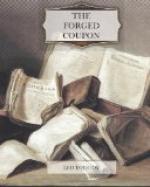The characteristics of a people so embedded in the soil bear a closer relation to their native landscape than our own migratory populations, and patriotism with them has a deep and vital meaning, which is expressed unconsciously in their lives.
This spirit of patriotism which Tolstoy repudiated is none the less the animating power of the noble epic, “War and Peace,” and of his peasant-tales, of his rare gift of reproducing the expressive Slav vernacular, and of his magical art of infusing his pictures of Russian scenery not merely with beauty, but with spiritual significance. I can think of no prose writer, unless it be Thoreau, so wholly under the spell of Nature as Tolstoy; and while Thoreau was preoccupied with the normal phenomena of plant and animal life, Tolstoy, coming near to Pantheism, found responses to his moods in trees, and gained spiritual expansion from the illimitable skies and plains. He frequently brings his heroes into touch with Nature, and endows them with all the innate mysticism of his own temperament, for to him Nature was “a guide to God.” So in the two-fold incident of Prince Andre and the oak tree ("War and Peace”) the Prince, though a man of action rather than of sentiment and habitually cynical, is ready to find in the aged oak by the roadside, in early spring, an animate embodiment of his own despondency.
“’Springtime, love, happiness?—are you still cherishing those deceptive illusions?’ the old oak seemed to say. ’Isn’t it the same fiction ever? There is neither spring, nor love, nor happiness! Look at those poor weather-beaten firs, always the same . . . look at the knotty arms issuing from all up my poor mutilated trunk—here I am, such as they have made me, and I do not believe either in your hopes or in your illusions.’”
And after thus exercising his imagination, Prince Andre still casts backward glances as he passes by, “but the oak maintained its obstinate and sullen immovability in the midst of the flowers and grass growing at its feet. ’Yes, that oak is right, right a thousand times over. One must leave illusions to youth. But the rest of us know what life is worth; it has nothing left to offer us.’”




